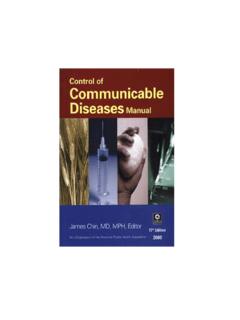Transcription of The Origin of Handwashing - Hardy Diagnostics
1 The Origin of hand washing Lack of communication leads to a slow start By Raquel Kahler November, 2014 t s 1846, and mothers and their infants are dying at a staggering pace postpartum often at a rate of 40% in some clinics. The cause: childbed fever or what is now known as puerperal fever. The infection is most often caused by groups A and B Streptococcus and was quite a mystery in the medical community in the middle of the 19th century. Important women such as Elizabeth of York, Mary Wollstonecraft, the mother of Jean-Jaques Rousseau, and the English queen Jane Seymour died of this disease shortly after giving birth. Though germ theory had its origins as early as the 16th century, the notion that invisible seed-like entities, poisonous insects, or worms were the cause of the disease was difficult for doctors to believe and was not widely accepted by the medical community.
2 Ignaz Semmelweis, the physician responsible for implementing hand washing practices in his clinics and drastically reducing puerperal fever rates, has garnered national attention for his ingenuity and for being targeted as a social pariah for going against his contemporaries. Semmelweis was the first doctor to causally associate the link between hand washing and childbed fever. However, puerperal fever has an even deeper history, one that is simultaneously astounding and mortifying. Figure 1: Ignaz Semmelweis, a Hungarian physician practicing at a hospital in Vienna, Austria, proposed hand washing and chlorine solutions in the OB ward in 1847. I Raquel Kahler is a Research and Development Microbiologist and Technical Support Specialist at Hardy Diagnostics . She graduated with dual degrees in Microbiology and Molecular Biology from California Polytechnic State University, San Luis Obispo.
3 Puerperal fever is considered a modern disease. Evidence of this disease is either rare or nonexistent before the 17th century, after which women started going to hospitals to give birth. In fact, even throughout the late 18th century and early 19th century, the mortality rate due to childbed fever was relatively low: generally less than 1%, according to data from Vienna General Hospital. Figure 2: Before Semmelweis instituted hand washing , the incidence of puerperal fever among women in the obstetrics ward was as high as 40%. However, the year 1823 marked the beginning of pathological anatomy, or autopsies, in Vienna General Hospital. It is also the year childbed fever-related deaths began to skyrocket. From this point on until Semmelweis implemented hand washing procedures, the death rate due to puerperal fever varied from just over 2% to as high as Given today s US maternal death rate of in 2013 regardless of cause, 9% due to one disease is significant.
4 In addition, it s presumed that not all puerperal-related deaths were accounted for at the time. Women who showed signs of infection and died after being released from the maternity ward or who were sent to the general hospital for care due to overcrowding were excluded from this data, so the actual rate is believed to be higher. Semmelweis was part of the golden age of the scientist physician; when doctors began to use symptom-based diagnoses as opposed to homeopathy to solve medical maladies. Autopsies became a large part of physician training into symptom-based diagnosis as doctors began to look for internal signs and symptoms. Consequently, autopsies were performed routinely on the deceased. The emphasis on getting to the root of disease through autopsy resulted in a growing trend in the dirty appearance of many doctors.
5 In addition, because doctors who performed autopsies were in the field determining the cause of sickness, they were revered among their colleagues and society. This led to the belief that the dirtier the doctor, the better the doctor. It was a point of pride for doctors to walk around in their coats stiff with blood from the last autopsy or surgery they performed, after which they headed straight to the maternity ward to do their shift delivering babies. Needless to say, this provided ripe opportunity for the transfer of infectious organisms from a corpse to a new mother or her infant. The idea that the agent of transmission was the doctor was preposterous and wholly rejected. Figure 3: Streptococcus bacteria is the main cause of puerperal fever. However Staphylococcus can also be involved. Charles Delucena Meigs, a well-known obstetrician at the time, is quoted as saying, Doctors are gentlemen, and gentlemen s hands are clean.
6 However, a few doctors saw the dangers of this bravado. Ignaz Semmelweis was not the first. In fact, a couple of years before Semmelweis published his findings on puerperal fever, an American doctor named Oliver Wendell Holmes published an article in the New England Quarterly Journal of Medicine and Surgery entitled, The Contagiousness of Puerperal Fever. In this article, Holmes identifies doctors as the link between successive cases of puerperal fever; his theory stemmed from seeing colleagues contract the disease after performing autopsies on the dead. Though Holmes s publication was groundbreaking, it was largely ignored and never reached the international medical community. Thus, Semmelweis research and conclusions are still considered novel. In addition, Semmelweis theorized that not only were doctors responsible for transmitting disease between patients, but that washing hands with a chlorinated lime solution reduced transmission.
7 While Holmes suggested purifying instruments and burning clothing after a case of puerperal fever, Semmelweis recognized the importance of good hygiene regardless of the previous patient s disease status. Semmelweis findings dramatically reduced the rate of puerperal fever in his clinic and saved countless lives. Unfortunately, both Holmes and Semmelweis were criticized for their findings. Holmes came under fire by two obstetricians Hugh L. Hodge and Charles Meigs yet maintained his reputation as a distinguished professor and doctor. He went on to publish another text on the topic, which became a cornerstone for the germ theory of disease. Figure 4: Semmelweiss often lashed out against his critics denouncing them as irresponsible murderers or ignoramuses. Semmelweis, on the other hand, was ridiculed and rejected by his colleagues, peers, and even friends and family.
8 Semmelweis became obsessed with childbed fever and could do nothing but think or talk about the disease. He had little patience for those who did not agree with his theory and talked vehemently to and about his opponents. Eventually, Semmelweis s obsession became his downfall and he was lured to a mental institution where he was placed in a dark room and severely beaten. He died just two weeks later due to a blood infection likely contracted during the beatings. Semmelweis was so rejected by the medical community at the time of his death that he was neither honored nor recognized for his contributions. Sadly, it took 20 years after his death for Semmelweis s findings on hand washing and the spread of disease to begin to take hold. Louis Pasteur, known as the father of microbiology, is famous for developing the first vaccine and for invalidating the notion of spontaneous generation.
9 Pasteur connected the germ theory of disease with Semmelweis data and was more successful at disseminating Semmelweis information. Today, hand washing is intricately connected with hygiene and is the foundation of modern medical practice. Semmelweis s story is interesting, but it s also one worth remembering. Not only was he one of the first champions to document the importance of hand washing , he is also an unfortunate example of poor objective peer review and communication. Semmelweis was not sheepish, but he faced a dogged community unable to be objective about their own practices. When his theory was rejected by the medical community, he became angry and obsessed with converting others to his viewpoint. Unfortunately, his anger and ineffective communication style resulted in his being professionally and socially ostracized.
10 Figure 5: Semmelweis work was commemorated with this statue built in 1904 in Hungary. However, the medical community did not live up to their own Hippocratic Oath. Consequently, because Semmelseis s findings were not analyzed objectively and readily accepted, more lives were lost to a completely preventable disease. Raquel Kahler Santa Maria, CA









